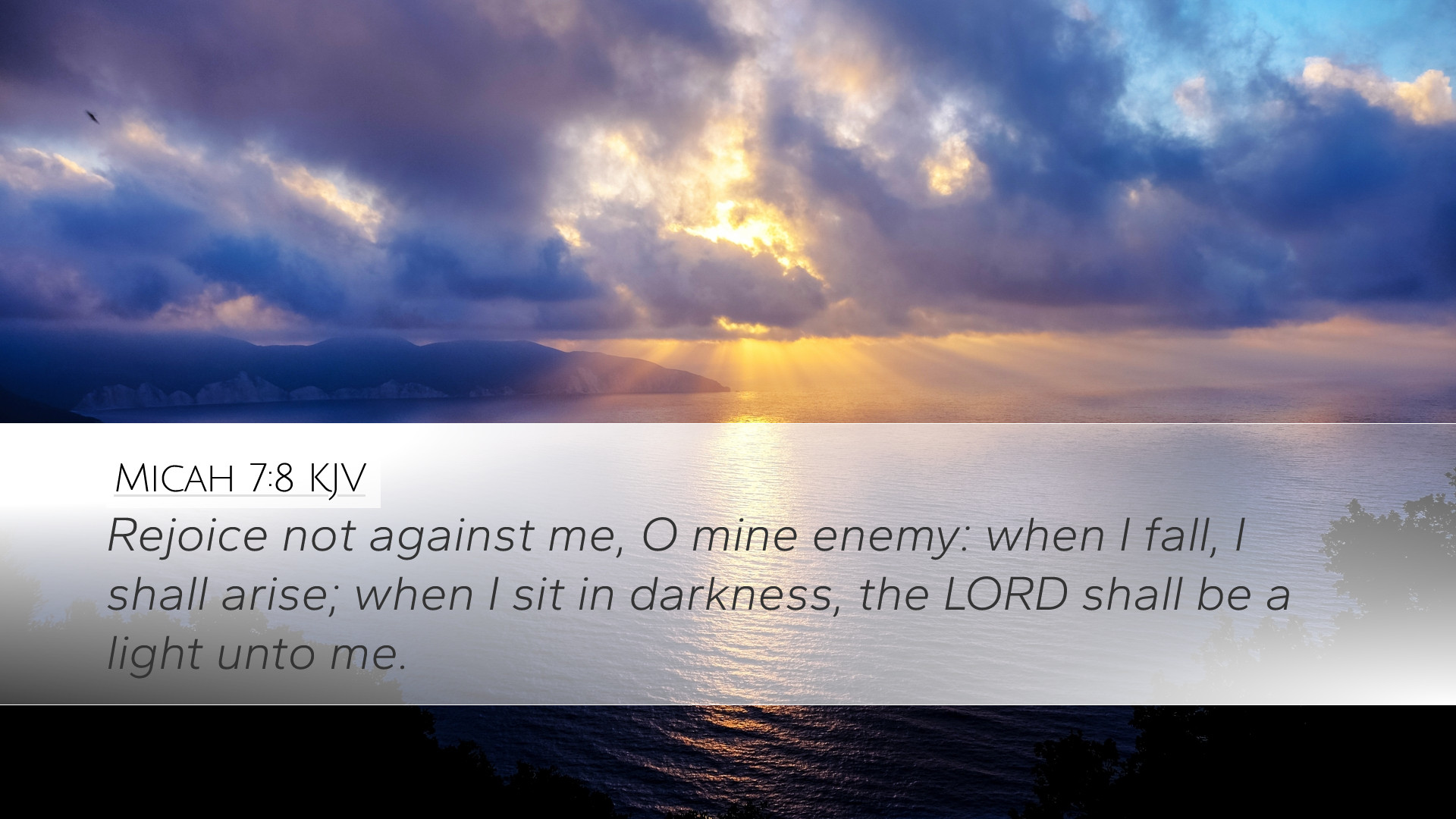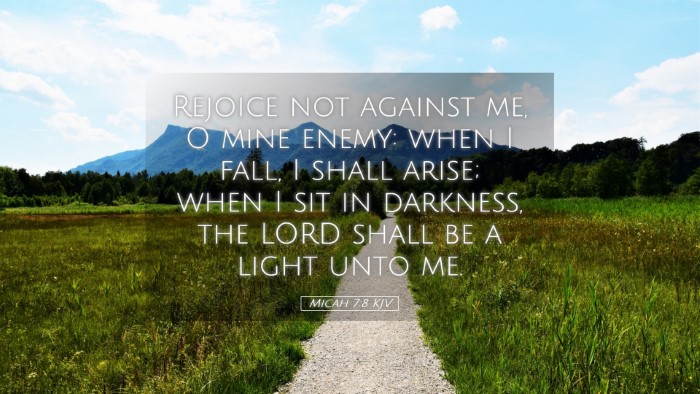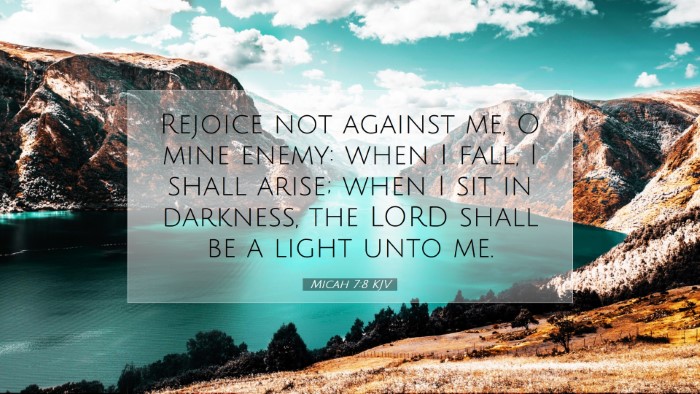Old Testament
Genesis Exodus Leviticus Numbers Deuteronomy Joshua Judges Ruth 1 Samuel 2 Samuel 1 Kings 2 Kings 1 Chronicles 2 Chronicles Ezra Nehemiah Esther Job Psalms Proverbs Ecclesiastes Song of Solomon Isaiah Jeremiah Lamentations Ezekiel Daniel Hosea Joel Amos Obadiah Jonah Micah Nahum Habakkuk Zephaniah Haggai Zechariah MalachiMicah 7:8
Micah 7:8 KJV
Rejoice not against me, O mine enemy: when I fall, I shall arise; when I sit in darkness, the LORD shall be a light unto me.
Micah 7:8 Bible Commentary
Commentary on Micah 7:8
Verse Reference: Micah 7:8 - "Rejoice not against me, O mine enemy: when I fall, I shall arise; when I sit in darkness, the Lord shall be a light unto me."
Introduction
This verse encapsulates a profound sentiment of resilience amidst adversity. The prophet Micah, speaking during a time of national calamity and spiritual decline, addresses his enemies and reminds them not to gloat over his downfall. Herein lies a message of hope and restoration, illustrating the theme of divine assistance in the face of tribulation, which is especially relevant for pastors, theologians, and students of the Word.
Insights from Public Domain Commentaries
Matthew Henry's Commentary
Matthew Henry emphasizes the tone of defiance in Micah's words. He notes that despite the apparent setbacks, the prophet maintains a hopeful outlook, expressing confidence in God’s salvation. Henry highlights that the phrase "when I fall" indicates the inevitability of failure in the human experience, yet it is coupled with the assurance of rising again. This reflects a theology of restoration, underscored by divine grace.
Albert Barnes' Notes on the Bible
Albert Barnes interprets this verse as a declaration of faith and trust in God. He acknowledges the emotional posture of the speaker who has faced significant trials. Barnes points out that "I shall arise" denotes a personal resilience, influenced by a relationship with God. He notes that the “darkness” represents trials and tribulations where God’s light becomes evident. Barnes encourages readers to see this as an allegory of hope — the believer, no matter how low, can expect God's intervention.
Adam Clarke's Commentary
Adam Clarke provides a linguistical and cultural context for Micah 7:8. He elaborates on the phrase "Rejoice not against me," elucidating it as a direct address to the adversaries who might be celebrating Israel's misfortunes. Clarke indicates that the prophet’s confidence is not rooted merely in self-assurance but is a confident expectation in God’s ultimate mercy and restoring power. He posits that the reference to sitting in darkness expresses the state of despair, but it is in these moments that God’s light becomes the guiding force.
Theological Implications
Micah 7:8 offers rich theological implications for understanding human suffering, divine justice, and mercy:
- Human Vulnerability: The acknowledgment of falling is a profound recognition of the human condition. Yet, as Henry suggests, it is our response to falling that is critical — we must strive to rise again through faith.
- Divine Intervention: The verse assures believers that divine light pierces through darkness, aligning with the broader biblical theme that God does not abandon His people in their trials.
- Hope Against Opposition: The exhortation to enemies is a powerful reminder of the hope maintained in adversity. This can inspire believers to remain steadfast, even when surrounded by challenges.
- Eschatological Relevance: The proclamation of eventual restoration serves as a foreshadowing of messianic hope — a reminder that the ultimate victory belongs to God and His people.
Practical Applications
For pastors and leaders, this verse encourages the encouragement of their congregations facing hardships:
- Encouraging Resilience: Teach about the importance of rising after a fall, integrating narratives of personal and communal resilience from church history or contemporary testimonies.
- Fostering Community Hope: Create spaces where believers can share their struggles and victories, reinforcing the idea that darkness moments can lead to testimonies of God’s light.
- Highlighting God's Faithfulness: Regularly remind congregants of God’s faithfulness through biblical stories and personal experiences that testify to His unwavering support during dark times.
- Positioning Opponents: Help individuals frame their adversities, including those who may oppose or challenge their faith, as opportunities for deeper trust in God.
Conclusion
Micah 7:8 stands as a testament to the enduring spirit of faith within the context of struggle. It provides a blueprint not just for personal recovery, but also for communal support among the believer’s fellowship. With insights drawn from respected commentaries, this passage deeply resonates with the journey of faith, the realities of life’s trials, and the assured victory granted through divine light. This message remains ever relevant for those shepherding congregations and individuals navigating through their own 'darkness' in today's world.


